Is the relentless pursuit of online virality eroding the very fabric of responsible digital citizenship? The "influencers gone wild" phenomenon, a disturbing trend sweeping social media, reveals a dark underbelly where attention-seeking antics often trump ethical considerations and genuine connection.
The phrase "influencers gone wild" has become a chilling shorthand for a new era of digital recklessness. It encapsulates the instances where social media personalities, driven by the insatiable need for views, likes, and shares, venture into territory best left unexplored. This can manifest in a variety of ways, from ill-conceived stunts and offensive content to the blatant promotion of deceptive or dangerous products. The result is a landscape where shock value and sensationalism reign supreme, often at the expense of truth, responsibility, and the well-being of both the influencers and their audiences. This dangerous trajectory demands a closer examination to understand the forces driving it, the impact it is having on society, and the potential pathways towards a more responsible and sustainable influencer ecosystem.
The pressures on influencers are immense. They are constantly battling to maintain relevance in a saturated market, where the next viral sensation is only a click away. Traditional content formats, like fashion hauls, makeup tutorials, or fitness routines, which once captivated audiences, can now feel stale and predictable. This forces creators to continually raise the bar, pushing boundaries and experimenting with increasingly outlandish content to capture the fleeting attention of their followers. The cycle feeds on itself, with each attempt to go "viral" often escalating the stakes, leading to a race to the bottom in terms of ethical conduct and responsible behavior.
Here is a compilation of some examples, highlighting the extent of the phenomenon that's been called, "Influencers gone wild":
| Incident | Description | Impact |
|---|---|---|
| Nudity in front of a sacred tree | An influencer posted images of themselves posing nude in a location deemed sacred by a community. | Offense caused to a community and potentially legal repercussions. |
| Illegal Stunts | Influencers participating in reckless behavior for views | This behavior poses a physical threat to the influencers and those around them, resulting in serious injuries and legal ramifications. |
| Offensive Material | Influencers sharing racist remarks, hate speech and other offensive content | This type of content is often deeply hurtful, promotes negativity and divisions. |
| Ads for Fake or Dangerous Goods | Advertisements of products which are false and unsafe for the users | Financial harm and potential health and safety risks. |
The term "influencers gone wild" serves as an umbrella, encompassing a range of problematic behaviors. These actions often go viral, not in a way that celebrates creativity or positive impact, but in a way that exposes the ethical lapses and the potential for harm. This highlights the risks of a culture that prizes shock value and sensationalism over truth and responsibility.
The ascent of social media influencers has been nothing short of meteoric. They have become significant figures, shaping societal values, consumer trends, and the very fabric of our cultural conversations. But this rise has also brought with it a dark side. Many influencers, driven by the pursuit of fame and fortune, do not uphold ethical standards. Their actions, therefore, have a wide-reaching impact.
Consider the implications on consumer trends, where the promotion of unsustainable fast fashion or the endorsement of unregulated dietary supplements can have serious environmental and health consequences. The constant barrage of aspirational content, often unattainable and heavily filtered, contributes to body image issues and a general sense of inadequacy among young people. The spread of misinformation and the promotion of harmful products further erode trust and expose vulnerable audiences to risk.
The phenomenon extends beyond mere content creation. It impacts lifestyle, morals, relationships, and fashion standards. Influencers can redefine norms. In the quest for engagement, they tread a fine line between shock value and authenticity. They may engage in behavior that may appear raunchy or wild to draw public attention, sometimes crossing the line into dangerous or illegal activities. For those who seek to build a brand, every post and every story becomes a tool for creating an image, which is used to gain audience and to garner more reach.
The "influencers gone wild" phenomenon isn't just a collection of isolated incidents; it is a symptom of a deeper problem. The current influencer ecosystem is often lacking in transparency, ethical guidelines, and accountability. The pressure to maintain relevance, coupled with the allure of rapid financial gain, creates a perfect storm for irresponsible behavior. However, there are reasons that are the foundation of this, and the reasons are well thought and can provide perspective, like the need to always be relevant and the necessity to create content that keeps the audience hooked. This pushes them to test new boundaries, sometimes crossing the lines of what is ethically or morally acceptable. This is not merely about individual actors, but about the systems and incentives that shape the influencer landscape.
The content being shared is a direct reflection of the influencers' actions, and this often impacts society's values. It's not an accident that society is seeing an increasing number of instances of "influencers gone wild" and the negative impacts from this. There is a direct correlation, with the influencers being a reflection of what society has become and what it is willing to accept. These influencers, with their reach and influence, shape consumer trends, promote lifestyles, and influence moral standards for an audience that has made them popular.
The responsibility lies not just with the influencers themselves but also with the platforms that host their content, the brands that partner with them, and the audiences who consume it. The influencers have a significant responsibility in shaping societal values, consumer trends, and cultural conversations. However, a collective effort is required to bring about a more positive and sustainable space within the industry. By fostering transparency, setting up ethical practices, and advocating for accountability, the influence of influencers can be channeled to promote better values and practices.
The lack of regulation and oversight is another key factor. Social media platforms, while often taking steps to address blatant violations, frequently struggle to keep pace with the ever-evolving tactics of those seeking to exploit the system. The algorithms that govern content visibility often prioritize engagement above all else, further incentivizing the creation of sensationalistic material. This highlights the need for a more robust regulatory framework that holds both influencers and platforms accountable for the content they disseminate.
Consider the potential impact on consumer behavior. The endorsement of a product or service by a trusted influencer can significantly influence purchasing decisions. However, if that endorsement is based on deceptive marketing practices or misleading claims, it can lead to financial harm, disappointment, and a loss of trust in the marketplace. This is where transparency and ethical conduct come into play, since they are essential to maintain audience trust.
The "influencers gone wild" phenomenon serves as a stark reminder of the power of social media and the importance of responsible digital citizenship. It demands a critical examination of the forces driving this trend, the impact it is having on society, and the potential pathways towards a more ethical and sustainable influencer ecosystem. There's no easy fix, but a combination of individual responsibility, platform accountability, and industry-wide collaboration is essential to navigate the challenges and ensure that the digital world serves as a force for good.
The final entry to this "influencers gone wild" list is a stark reminder of the implications of this trend. The incidents described highlight the need for greater responsibility and ethics in the influencer space. The concept of "influencers gone wild" emphasizes the constant need for engagement in a market that is oversaturated. Influencers often find themselves under immense pressure to generate content that captures attention and keeps their audience engaged.
The shift towards "influencers gone wild" behavior stems from this need for constant engagement. Traditional content that once captivated audiences, like fashion hauls, makeup tutorials, or fitness routines, can now feel mundane. To stay relevant, influencers push boundaries, resulting in instances of questionable behavior. This often manifests in pushing boundaries, sometimes too far, leading to situations that risk crossing lines.
The path towards a more responsible influencer landscape requires a multifaceted approach. It begins with self-regulation and ethical conduct. Influencers must prioritize truthfulness, transparency, and the well-being of their audience. This includes being upfront about sponsored content, conducting thorough product reviews, and refusing to promote products or services that are deceptive or harmful. Beyond that, it includes holding themselves to higher standards.


